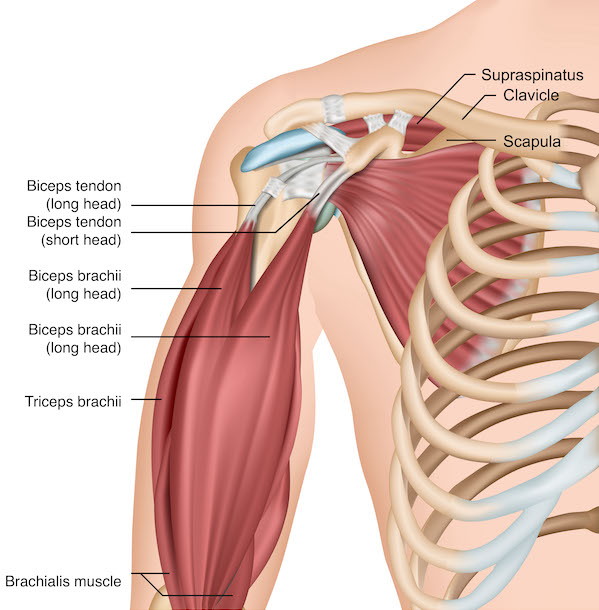Biceps Tendinitis
Introduction
Biceps tendinitis is a common condition characterized by inflammation or irritation of the biceps tendon, which connects the biceps muscle to the shoulder and elbow. This condition can cause pain, stiffness, and limited mobility in the affected arm, impacting daily activities and quality of life. In this blog post, we’ll explore the causes, symptoms, and treatment options for biceps tendinitis, as well as provide tips for managing and preventing this condition.
Causes of Biceps Tendinitis
Biceps tendinitis often occurs as a result of repetitive overhead activities, such as lifting weights, throwing, or painting. Overuse of the biceps tendon can lead to microtears and inflammation, contributing to the development of tendinitis. Other factors, such as age-related degeneration, poor posture, and shoulder instability, can also increase the risk of biceps tendinitis.
Symptoms of Biceps Tendinitis
The symptoms of biceps tendinitis can vary in severity and may include:
- Pain in the front of the shoulder that worsens with overhead movements
- Tenderness and swelling in the biceps tendon
- Weakness in the affected arm
- Crepitus or cracking sensation when moving the shoulder
- Difficulty performing daily activities, such as reaching or lifting objects
Diagnosis and Treatment Options
If you suspect you have biceps tendinitis, it’s essential to seek medical evaluation for an accurate diagnosis. Your healthcare provider may perform a physical examination, review your medical history, and recommend imaging tests, such as X-rays or MRI, to confirm the diagnosis and rule out other underlying conditions.
Treatment for biceps tendinitis typically involves a combination of conservative measures and lifestyle modifications, including:
- Resting the affected arm and avoiding activities that exacerbate symptoms
- Applying ice packs to the shoulder to reduce pain and inflammation
- Taking nonsteroidal anti-inflammatory drugs (NSAIDs) to alleviate pain and swelling
- Performing gentle stretching and strengthening exercises to improve flexibility and muscle strength
- Modifying activities and ergonomics to reduce strain on the biceps tendon
- In severe cases, your healthcare provider may recommend corticosteroid injections or surgical intervention to relieve symptoms and restore function.
Preventing Biceps Tendinitis
While biceps tendinitis cannot always be prevented, certain strategies can help reduce the risk of developing this condition:
- Warm up properly before engaging in physical activities, especially those involving repetitive arm movements.
- Maintain good posture and avoid slouching to minimize strain on the shoulder and biceps tendon.
- Gradually increase the intensity and duration of your workouts to avoid overloading the biceps tendon.
- Incorporate cross-training and flexibility exercises into your fitness routine to maintain overall musculoskeletal health.
Conclusion
Biceps tendinitis can be a painful and debilitating condition, but with prompt diagnosis and appropriate treatment, most individuals can achieve full recovery and return to their normal activities. If you’re experiencing symptoms of biceps tendinitis, don’t hesitate to seek medical attention for personalized evaluation and management. By understanding the causes, symptoms, and treatment options for biceps tendinitis, you can take proactive steps to protect your shoulder health and maintain an active lifestyle.
“At Arunalaya Healthcare, we pride ourselves on being the best physiotherapy center in Delhi. Our dedicated team of experts offers top-notch physiotherapy treatment tailored to your needs. Experience the difference with the leading physiotherapy clinic in Delhi area. Our commitment to excellence ensures that you receive the best physiotherapy care possible. Trust Arunalaya Healthcare for the best physiotherapy treatment in Delhi. Our advanced physiotherapy solutions set us apart as the premier choice for your rehabilitation needs. When it comes to physiotherapy, our center stands out as the best in Delhi. Choose Arunalaya Healthcare for comprehensive physiotherapy solutions that deliver results. Visit Arunalaya Healthcare today and discover why we are the best physiotherapy center in Delhi.”
Biceps tendinitis relief | Shoulder tendon pain solutions | Physiotherapy for biceps tendinitis | Treating biceps tendon inflammation | Preventing repetitive strain injuries | Managing shoulder inflammation | Overuse injury prevention tips | Pain management for biceps tendon issues | Strengthening exercises for tendinitis

